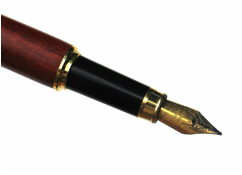 The fictional writer/detective Richard Castle of the ABC detective show Castle had this to say about writers and their ideas for novels: “There are two kinds of people who sit around all day thinking about killing people…mystery writers and serial killers.” Although, I don’t literally sit around all day thinking about killing people, I have spent an inordinate amount of time thinking about if and how characters should die. Once, after reading one of my novels, a hospital coworker asked me with an askance glare that, I’m certain, she saved for shady characters skulking through her neighborhood and baby seal killers, how did I come up with the ideas for my books? As a writer of thrillers, ideas for novels come to me from different sources. I suppose the biggest source is the daily news. Whether newspapers, magazines, or TV shows, there are stories that spark my imagination. I save particularly interesting ones. Another source is conversations with friends and acquaintances. Most people, in spite of themselves, love to gossip, and gossip can be a rich source of story ideas. Of course it helps to change the name, gender, and age of the person gossiped about, unless, that is, you like lawsuits. A third source is personal experience. Have you ever taken a wrong turn while driving in a strange city and found yourself in a shady neighborhood in the middle of the night? As you snake your way down a particularly dark street, a group of hulking young men approach. Or maybe you’ve walked by a man and woman in a heated argument gesticulating wildly with expletives flying like machine gun bullets. I recall one situation in which my wife and I were driving a rental in Orlando. As we drove up an onramp to the interstate we pulled to a stop behind three cars. Apparently the distant car had, for some reason, stopped causing the middle car to suddenly come to a stop. Unfortunately, the last car couldn’t halt in time and slammed into the rear of the middle car. The driver of the sandwiched car, livid of course, jumped out, ran up to the lead car, and began giving the driver an earful. I inched onto the grass and drove past the scene hoping nothing more transpired. As I blended into traffic on the interstate I kept glancing in the rearview mirror praying that I didn’t see the young man with smashed rear bumper in hot pursuit. So, why was I so paranoid? It was the writer in me. While most people would have seen just an unfortunate fender bender, I saw a young man, maybe a criminal with a record, as a psychopath just sent over the edge. As I drove by I imagined him leaning into the offending driver’s side window, pulling a revolver. I could almost hear the “pop, pop, pop” of gunshots and see lightning like muzzle flashes from within the car. He’d then look up in time to see my car go by, read the license plate, hop into his souped-up vehicle and begin the chase. The crazy scenario I just described probably just betrays a suspicious and likely idiosyncratic mind. (OK, guilty as charged.) But it also reveals an active imagination. Can’t you see the opening of a thriller? A nice suburban couple pursued across the country by a crazed killer. Oh, by the way, feel free to use the premise if you like. I’ve got a million others. Although, it doesn’t require a wild imagination to find ideas as a fiction writer, it certainly helps. But, it does require the willingness to exercise your creativity. To use the old cliché, to think outside the box. What are some of the ways you come up with ideas? I’d love to hear from you. Next time I’ll discuss how I came up with the ideas for my two novels: Fatal Impact and The Peril Protocol.
0 Comments
 How does theme fit into your story? I’ll answer the question with another question: what happens to your character in the course of your story? Well, you say, she is a shy, withdrawn, CIA analyst who must go into the field to thwart the sale of a nuclear detonator to a terrorist group. She is a fish out of water in an exotic foreign country but overcomes her social awkwardness to thwart the terrorists in the nick of time. So, your theme could be believe in yourself, or facing your fears, or never give up. I’m sure you could thing of some better ones. The point is that theme flows from your hero’s change as she progresses through the story. This is called character arc. How does character arc work? The hero bumbles and stumbles through the story, having setbacks and learning from them then having epiphanies and moving forward. And your theme is expressed through your character’s journey through the story. Basically, theme and character arc are closely connected. With no theme and character arc you have no story, or, at best, extended water cooler gossip. Remember, your theme and character arc come about through that old adage on writing, “show, don’t tell.” In my novel, The Peril Protocol, the hero, Hope Allerd, must find a serial killer. She’s initially motivated by her hatred of a petty thief who murdered her parents and what he represents. As the story progresses, she slowly realizes that only by forgiving can she move forward and release the burdens of her past. But, wait, you say, what about the series character such as James Bond or Jack Ryan. They never change or grow. That’s what makes them iconic. And you would be right. Although, there is no character arc for these heroes, you can still find a theme. The obvious one is good always conquers evil. However, series characters can still have a character arc according to Larry Brooks in his book , Story Engineering. If you don’t believe it just visit a brick and mortar or online comic book store. More likely than not, you’ll find a superhero such as Batman or Spiderman in an angst filled situation such as having to murder his best friend in order to save the world. That’s just dripping with theme. Find the theme in your novel. It’s not that difficult. As a writer you merely have to present the question, its up to your readers to provide the answers. After all, theme is a matter of opinion. And there’s no rule that says you have to have only one theme. Theme is an important part of writing. It makes your story one that your readers will be sure to remember. You’re at a swanky party. The conversation and drinks are flowing. Talk turns to writing and you happen to mention that you’ve written a novel. Then someone asks, “What’s it about?” “Well, “ you say, “a stock broker embezzles millions of his client’s money an runs off to South America. And then he--” “No,” they say, “what’s it about?” They’re asking you about your story’s theme. So, what is “theme”? The dictionary definition states that theme is: “the main subject that is being discussed or described in a piece of writing, a movie, etc.”. But, wait, doesn’t the plot describe the main subject of your writing? Well, plot does describe what happens in your story. But, theme is what the story is about. The underlying idea in your work is your theme. If your plot is about a man who gets out of prison and overcomes the stigma of being an ex-con to eventually found a Fortune 500 company, then your theme would be how persistence pays off. Let’s take another example. You write about a woman who leaves a loveless marriage with her two children and few resources. She comes to a new town to start over and encounters obstacle after obstacle. At her lowest point sympathetic townspeople rally to help her out. That’s the plot. The theme might be love thy neighbor or love one another. While the plot is the moving muscle and sinew of your novel, the theme is its beating heart. Next time I’ll talk about how you can incorporate theme into your story.  As stated in my previous blog, outlining your novel is imperative for a well written work. I’ve found that there are other advantages to outlining also. Advantages of outlining that I’ve found include:
|
Archives
June 2022
Categories |

 RSS Feed
RSS Feed